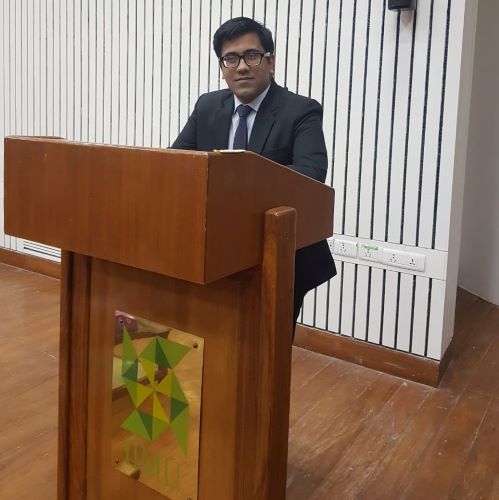“No obstacle is too big for you, no dream too great. You have the greatest force in the universe on the inside.” - Joel Osteen
We often give up on our dreams looking at the potential obstacles in our path. But true to the quote, all the obstacles can be surpassed if you have the will to fight for your dreams. I am an engineer, an IT professional, an upcoming IT manager.
But what if I told you, if it were not for my family and my will to go on, I wouldn’t have been able to see!
Early Life
I was born in Varangaon, a village in Northern Maharashtra, in a traditional retail business-minded family, where each child is expected to inherit family business in future. When my family found out that I’m severely visually impaired, they did everything to treat my eyes while also trying to keep me at par with other kids of my age in terms of education. I was enrolled in a local Marathi school, where I had to sit very close to the blackboard to be able to see it. My teachers never allowed me to enter into a Computer room, fearing it would harm my eyesight. I decided to learn it anyhow and on my own.
Family Business
Like all my siblings, I was also trained in my family business by my grandfather, where I learned standard business topics like cross-selling, up-selling and importance of services and customer satisfaction in a retail business. Soon, I started helping my father with a telecom distributorship, where I was handling daily operations. My father had to buy a computer to manage his business, this was an excellent opportunity for me, and I started learning computers although with some resistance from all family members.
Higher Studies
Fortunately, I realized that I had to come out of my comfort zone of the village and do something on my own, to be able to do what I liked. By standard 10th, by helping my father in his business, I developed a passion for computers and dreamt of pursuing my career in technology to prove myself one day. There was no way my parents would have sent me out of the village to study because of their conservative business mindset and my eyesight.
I decided to follow an unusual route and took admission in Polytechnic Diploma in IT at Government Polytechnic so that I would be able to play with computers. I was denied admission, as the college felt I would waste a government seat and leave the course unfinished. Somehow, I managed to convince the admissions committee. My parents were happy that I was excelling in my studies and sent me to MIT, Pune for my engineering where I was part of organising various tech-fests and technical workshops for students and for the first time learned how to be a team player.
First Job
I grabbed an opportunity to work for the world’s second-largest telecom company, Vodafone. My first project manager was hesitant to take me in his team seeing my thick glasses, but with time I was able to convince them that I could be an asset to the team. I was involved in the Innovation group of my company where people could discuss new solutions for existing technical problems in the company and train newcomers alongside my regular work. My eyesight was never a problem for me because I was very determined about following my passion and contribute to technological space.
“As we look ahead into the next century, leaders will be those who empower others.” - Bill Gates
Life At IIM Udaipur
At IIM Udaipur, I was amazed by the diversified batch-mates I met who were filled with various perspectives, experiences and, of course, that provided an immense learning curve. I was nervous due to my vernacular background and lack of confidence in communication. But, due to early exposure to business, I was never hesitant in taking decisions in my life. With the help of my professors and my friends, I overcame my fears and learned how to develop products and services which are customer-centric and can empower people. Still following my heart, during the course, I took up courses inclined towards IT and Analytics. Interacting with the faculty about the technology and the different dimensions it brings to management was a great learning experience.
The Path Ahead
As a part of campus placements, I tried to chart a return to the IT industry. For this very purpose, I was largely focussing on just the IT related roles coming to campus, be it as an IT Consultant or as a Manager. With my background as a developer in Vodafone and my evident passion for technology, my eyesight couldn’t become a hindrance in my path. When given a chance, I managed to showcase my technical capabilities and made the cut in one of the top IT firms that visit the campus, MAQ Software.
Someone who was considered as destined to fail due to the severity of problems is now pursuing excellence just because my family refused to bow down. The fight is not yet over, but neither am I.
____________________________________
About the Author:

Lakhan Menghani is a member of the 2019 outgoing batch of IIM Udaipur. He is a technology enthusiast who loves computer games and coding.
What makes Lakhan's journey special: He is the first from his village to graduate from an IIM, that too despite his visual impairment, and excels in a field where visual impairment is a serious drawback.
